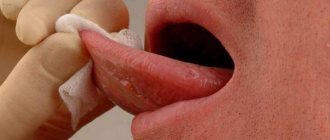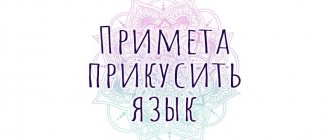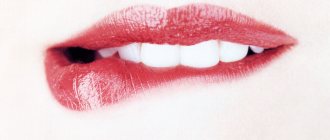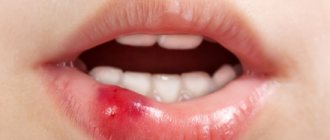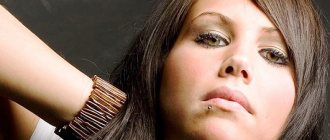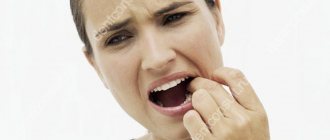A person who knows how to think learns a lesson even from superstitions. The sign that biting your lip means a quarrel should not be interpreted unambiguously, but it should definitely be taken into account. After all, such superstitions have a justification, from a psychological point of view.
Pay attention to the details of what happened - and you will be prepared for any surprises. Biting your lip is far from the most pleasant event, but it does not cause serious problems, especially if you take action in time.
Bitten during a conversation, there are angry people nearby
During a conversation
If during an exciting conversation a person accidentally bites his lip
, which means he
is in a hurry to convey some information and see the interlocutor’s reaction to it.
The sign says you need a little ? slow down, weigh your words before expressing them. And the interlocutor must take into account and listen carefully to what is said.
There is another meaning of this sign: the speaker is dissatisfied with what is happening now, but does not realize it
, so his body is forced to directly signal about this. It can also be a signal of empty judgments.
Also, if during a conversation someone bites his lip, then you should look at him carefully. Perhaps this means he's saying too much stuff that shouldn't be said.
.
Or he holds a grudge because he is trying to restrain him, and also, a topic was raised that is painful for him
.
In any case, you should pay attention to the topic of conversation in which this reaction manifested itself. And to understand the reasons for what happened, you should take a closer look in this direction.
Why bite your cheek
Each one bit the inside of his cheek. These sensations are unpleasant. Usually a wound forms on the inside. If this happened by accident and not during a meal, you can look for an explanation in folk wisdom.
Left
Damage on the left side promises trouble. But here it is necessary to take into account who exactly bit the left cheek - a man or a woman. In the first case, the sign promises the victim bitter disappointment in life. But a joyful event awaits the fair sex.
Right
If the cheek on the right side is damaged, nothing good should be expected. What happened warns of erroneous behavior. A person should pay attention to how he behaves with others and treats friends and relatives.
Bite in doubt
A bite on the lip of a doubting person may not be a superstitious sign at all, but can be interpreted from a psychological point of view. Because anyone can bite their bottom lip
, it just shows that the person is
very passionate about what he is talking about.
Understanding this will help analyze all the signs from the interlocutor in communication. For example, if he is open and communicates freely, then this should be interpreted as excitement and increased emotionality
. And if he is reserved and prudent, then most likely his subconscious lip biting means something serious.
Neutralizing a bad prediction
The easiest way is to ignore the negative interpretation. To be sure, immediately after the bite you can cross yourself and say: “Mind me.” It is believed that such actions neutralize bad consequences.
If the trouble occurred in the apartment, you can use an alternative method. You need to throw a pinch of regular salt over your left shoulder. To scare away evil forces, folk wisdom advises keeping any item made of silver with you. This metal protects against negativity.
A bite on the cheek or lip is not always associated with some kind of bad omen. Usually this indicates the person’s carelessness and has a simple explanation. In case of excessive suspiciousness, you should pay attention only to a good interpretation. This can lift your spirits.
When eating
When left alone with yourself while eating, you may accidentally bite your lip
, - this indicates that
a love kiss is worth waiting for in the near future.
As well as if during the day you
involuntarily, from time to time, bite your lips.
This sign is justified in human physiology. And it’s no coincidence, because if you kiss for a long time, the blood flows more intensely into the lips, making them rosy and swollen. When bitten, the same effect occurs. So, the superstitious omen can be turned in the opposite direction: biting your lips means hot, passionate kisses.
Even in ancient times, beauties resorted to all sorts of tricks to make their lips brighter.
If your interlocutor bites his lower lip while eating,
negative intentions
towards the other These may be fleeting thoughts, resentment or anger. Which can even lead to actions directed against the person to whom the speech is addressed.
You accidentally bit your upper or lower lip: what do both of these cases mean?
If you happen to bite the lip located at the top of your mouth, expect joyful events. The habit of biting your lower lips may indicate certain characteristics of your character. Mystics consider such people to be indecisive. They are overly suspicious and driven, tend to artificially limit themselves with various rules and regulations. Such people are afraid to live in accordance with their true desires, often adapt to others and subsequently regret missed opportunities. However, if your character does not resemble this description, then folk wisdom advises you to expect some kind of pleasant surprise.
Lost weight: what Sofia Tarasova sacrificed for the sake of “VIA Gra” (new photos)
It’s good to wash often: myths about shampoo and hair care that only harm
Why French children behave well: eight ways to raise them
Signs that touch the upper lip are even nicer. Physiognomists believe that biting this part of the body indicates an attempt to restrain your strong feelings: love, passion and erotic attraction. If something like this happened to you, then get ready for the future fulfillment of your desires, a date with your loved one and hot kisses. Accidentally biting your upper lip once means a celebration in the future. You can safely start preparing for it.
Signs warn of bad consequences that can await you if your lips are injured on the outside. This may be due to the fact that they appear only in cases where a person is so immersed in his inner experiences that he has lost self-control.
A disastrous problem
A harmless, inadvertent lip bite is an infrequent and minor injury that is not worth worrying about. It is easily self-healed by saliva, which has a disinfecting effect, and heals quickly. However, if the damage does not go away after two days or increases in size, you should consult a doctor.
As well as regular biting for no apparent reason. Since frequent biting may indicate a physiological problem - an incorrect bite, an uneven toothbrush or a bad denture. In this case, you need to consult a doctor, and superstitions and signs then have nothing to do with this.
In fact, regardless of whether lip biting is a superstition, the greater evil is the habit of doing it, which over time turns into a big problem. And this is not superstition, but a well-founded medical point of view.
How to properly treat a wound
Don't take folk beliefs too seriously. Take care of your health first. Your algorithm of actions should be as follows:
- Rinse your mouth with clean water at room temperature. It is also advisable to blot the bite area with hydrogen peroxide.
- Apply a piece of ice wrapped in a cloth to your wound for 5 minutes. This measure will relieve swelling and pain;
- Drink a cup of warm green tea, chamomile infusion or St. John's wort. Their antiseptic and tanning properties will help speed up the healing process.
If the scratch is small, then there is no need to treat it so carefully. Our body's natural healing ability will handle it itself within a few days.
Noting
Most often, you can accidentally bite your lip in emotional moments: excitement, fear, irritation. Or in situations of containment, when you can’t or don’t want to say too much. You need to be attentive to yourself and your surroundings, noticing body language: this will help you see the picture more fully and better understand yourself and your opponent. The main thing is that after all these worries the habit of biting the lip does not remain with the person.
There is no need to treat superstitions as law or inevitability. However, it is also unwise to ignore them. The best way is to notice the signs, be aware of what you see, but use common sense.
Every day we send each other many signs - some are veiled, others are direct, but most of them simply go unnoticed. It would be correct to take into account and take into account what has been noted, and also not to turn a blind eye to psychology and the physical world with its own laws.
Sign by day of the week
- Biting yourself on the lip on Monday in any situation, anywhere is a warning sign. It shows that a person is not very good at keeping the secrets entrusted to him, so he risks being left without friends.
- On Tuesday, the bite warns against empty chatter. You can kill time with more pleasure and less risk of driving others crazy.
- Biting your lip on Wednesday means you need to “cleanse” your inner circle of gossipers. Try not to open your soul to those who have not proven their devotion.
- On Thursday, the sign indicates a noisy feast or some kind of public event, participation in which will require your eloquence.
- On Friday, a bitten lip is a hint of unrealistic hope. You will expect some results from meeting and communicating with an important person, but everything will end with the utterance of banal slogans and truisms.
- To bite yourself on Saturday means to become a victim of deception or manipulation, which will be hidden under the guise of friendly participation.
- The same thing on Sunday - the need to take a time out and relax alone.
Causes of deep bite formation
The appearance of a deep bite defect is influenced by a number of reasons:
- genetic - the characteristic structure of the skull bones;
- intrauterine - infectious diseases of the mother during pregnancy, toxicosis, congenital short frenulum of the tongue, complicated childbirth;
- acquired - diseases of the respiratory system and oral cavity, rickets, metabolic disorders of the body, unbalanced artificial feeding, insufficient amounts of solid food, undesirable habits of holding a finger or pencils in the mouth, premature removal of baby teeth, trauma to the jaw.
Types of deep bite
Deep bite is classified as a vertical anomaly and is characterized by varying degrees of depth of closure of the lower incisors by the upper incisors.
There are two types of deep bite:
- Distal – characteristic features of the bite are: underdevelopment of the lower jaw, disproportionate development of the face, expressed by a small chin.
- Neutral – expressed by the following characteristics: the dental crowns of the lower incisors are practically overlapped by the upper teeth, the shape of the chin is normal, the mental fold is deep.
By their nature, deep bite is distinguished:
- reducing bite - when, during closure, the support of the incisors of one jaw to the dental cusps of the opposite row is lost;
- traumatic bite - when the frontal part of the lower dentition, when compressed, comes into contact with the mucous membrane of the upper one, damaging its soft tissues;
- incisal or frontal deep overlap - is determined by the complete absence of contact of the dentition with each other during compression, resulting in damage to the mucous membrane of both jaws due to improper contact of the incisors.
Ways to eliminate deep bite
After research has made it possible to establish the cause and degree of pathological occlusion, the orthodontist chooses a method for eliminating deep bite.
The age of the patient plays an important role in determining the method of treatment.
For children during primary occlusion, the orthodontist may limit himself to recommendations:
- eliminate bad habits;
- introduce a sufficient amount of solid food into your daily diet;
- if necessary, perform excision of the frenulum of the tongue;
- cure carious teeth;
- prosthetics of early lost milk teeth;
- carry out myogymnastics.
Adults need to put in much more time and effort to correct a deep bite.
The following orthopedic structures and methods are used:
- braces - the type is selected taking into account the malocclusion and the financial capabilities of the patient;
- Gebst apparatus - used after braces to rebuild muscle function;
- aligners and aligners;
- in difficult situations, surgical intervention is indicated.
After eliminating the pathology of deep bite, a recovery period is necessary. Typically, its duration takes twice as long as the therapeutic period. Wearing retainers, mouth guards, and special plates will help consolidate the achieved results.
Methods for diagnosing deep bite
The presence of a deep bite can only be determined by an orthodontist. After a visual examination, a series of studies are carried out to determine the cause and type of existing pathology as accurately as possible.
The following actions are carried out step by step:
- Making casts and models for diagnostics. It is important to know the depth of overlapping of the incisors, the width of the natural crowns of the lower and upper teeth, their displacement and angle of inclination, the size of the sagittal gap, etc.;
- Study of photographs of the face (profile, front);
- Orthopantomogram (panoramic image);
- Teleradiography;
- Occludogram (with its help, dental occlusion is assessed).
